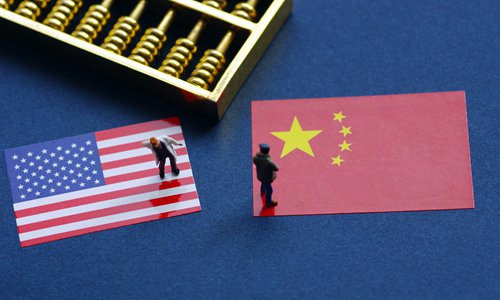HOME >> OPINION
Trump delusional in believing trade war will not harm US
By Zhang Tengjun Source:Global Times Published: 2019/9/2 21:28:40

Photo: VCG
US President Donald Trump reportedly signaled on August 25 he might regret launching a trade war against China. It was the first time he had made such remarks as widespread debate ensued over whether or not he would make policy adjustments. Hours later, the White House denied all speculations, claiming that Trump was "greatly misinterpreted," in an attempt to prevent more damage from the president's words.
In defense of the trade war, South Carolina Republican Senator Lindsey Graham said in late August that "the Democrats for years have been claiming that China should be stood up to. Now Trump is and we just got to accept the pain that comes with standing up to China. It seems that Republicans and Democrats have revealed a confluence in attitude toward trade war with China. But opinions differ over what does it really mean.
Since the trade war against China started, both sides have raised tariffs against each other. Trump's escalating threats against China were out of his comprehension of domestic political consensus, which holds that US-China trade ties are unfair and need to be changed. Republicans support Trump to escalate pressure toward China. Although Democrats verbally oppose the tariffs, they simultaneously hope Trump's moves could suppress China's rise, forcing China to make concessions. Both parties have their political calculations on the trade war issue. Now, the situation has not generated enough motivation for them to change their positions, which is one reason why Trump is able to continuously ratchet up tariffs on Chinese goods.
However, the situation will be different with the trade war causing irreversible damage to the US. Stock market plummet has shaken market confidence. If the US economy and employment rate are impacted, which is inevitable, opposition to the trade war will grow stronger, driving a big wedge between the two parties and even dividing Republicans. This will be Trump's hardest challenge.
The Trump administration believes the trade war will benefit the US in the long run, although the country will suffer short-term pains. With this logic, Trump has lambasted China for causing US domestic economic problems, saying the trade war would bring the manufacturing industry back to the US. At the same time, the Trump administration has used government subsidies to pacify those industries which have been poorly influenced by the trade war.
During the 2018 midterm elections, Trump voters accepted his rhetoric that short-term losses would yield greater profits. More importantly, many of them believed Trump would win the trade war over China.
Trump believes China would surrender as the trade war escalates, and thus, the US would embrace huge wins at little expense. However, Trump has underestimated China's resilience and fighting capabilities against trade bullying as well as the public will of all Chinese who are willing to fight to the end. Trump's schemes would only become a floating castle.
Another internal contradiction of Trump's trade war lies in his obsession with reelection. Trump hopes to make bigger achievements that would ensure his reelection in 2020. It has been proven the economic situation during election years directly affects election results. Trump hopes to achieve a trade deal with China that favors the US so that he can bolster his image as a defender of the US economy.
Meanwhile, Trump has gone back on his words repeatedly during the trade negotiations. The goal is to reach a deal with maximized benefits by applying maximum pressure and deterrence against China. But he has made a mistake. China would never accept a deal that hurts its own interests. The consistent attitude from China has been, "Talk? Our door is wide open. Fight? We will fight to the end!" Trump's wishful thinking will more likely end in vain.
People may have different opinions about who has suffered the most from the trade war and who will come out the winner. One thing that can be guaranteed is the trade war will not end with one clear winner and one completely damaged loser.
The author is an assistant research fellow at the China Institute of International Studies. opinion@globaltimes.com.cn
RELATED ARTICLES:
Posted in: VIEWPOINT